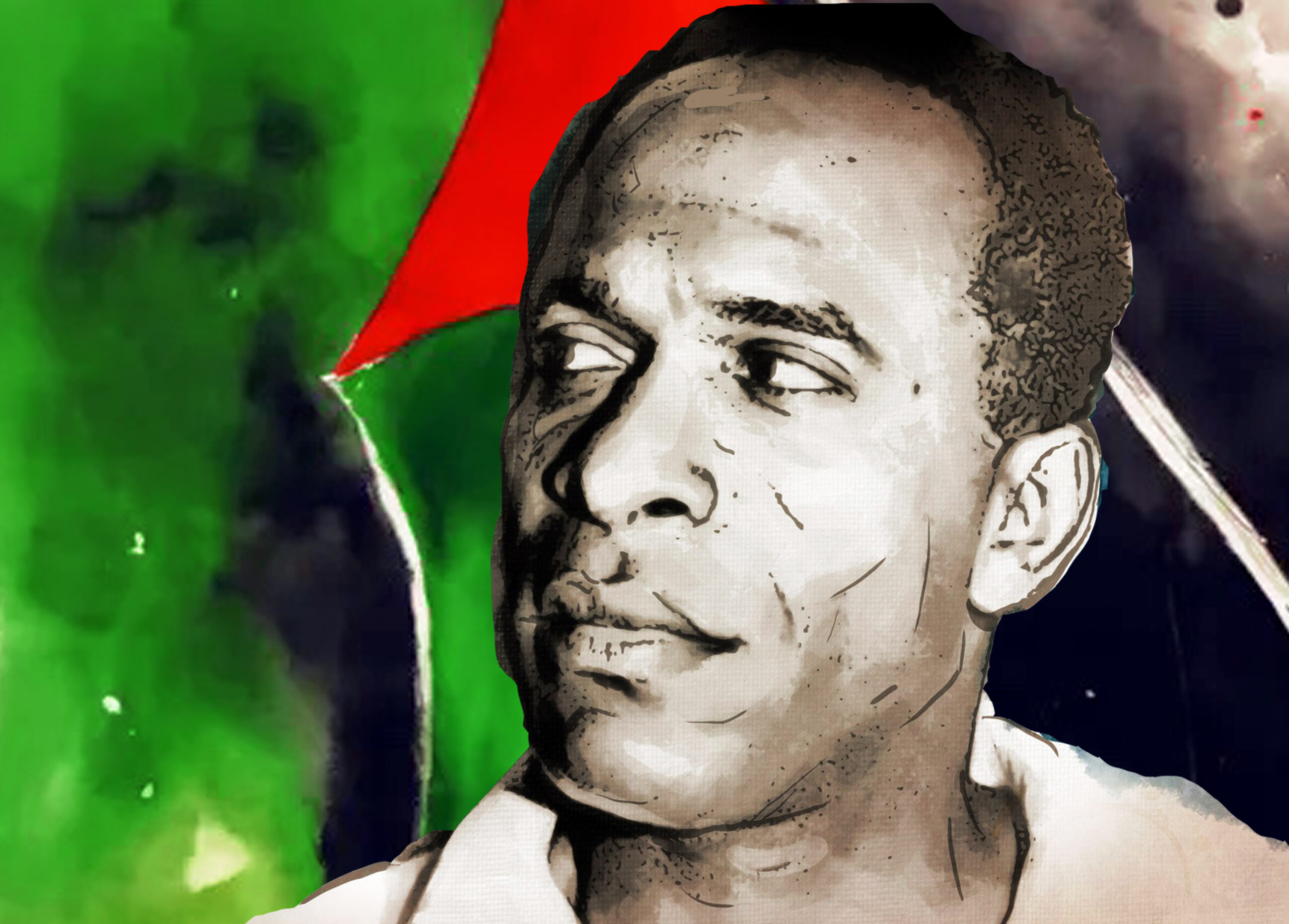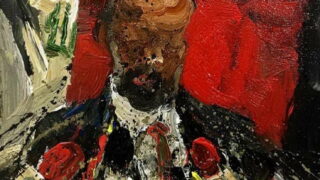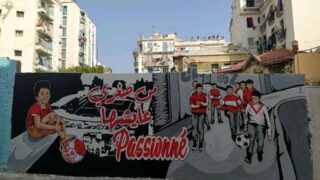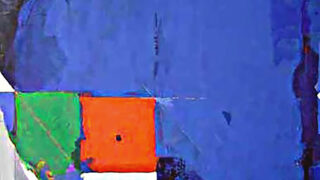" This file was produced as part of the activities of the Independent Media Network on the Arab World. This regional cooperation brings together Maghreb Emergent, Assafir Al-Arabi, Mada Masr, Babelmed, Mashallah News, Nawaat, 7iber and Orient XXI."
Hamza Hamouchene*
‘For Europe, for ourselves, and for humanity ... we must work out new concepts and try to set afoot a new man.’ (Fanon, The Wretched of the Earth)
Frantz Fanon’s dynamic and revolutionary thinking, always centred on creation, movement and becoming, remains utterly prophetic, vivid, inspiring, analytically sharp and morally committed to disalienation and emancipation from all forms of oppression. Fanon strongly and compellingly argued for a path to a future where humanity ‘advances a step further’ and breaks away from the world of colonialism and the mould of European ‘universalism’. He represented the maturing of the anti-colonial consciousness and was a decolonial thinker par excellence. As a true embodiment of l’intellectuel engagé, he transformed the debate on race, colonialism, imperialism, otherness, and what it means for one human being to oppress another.
Despite his short life (he died from leukaemia at the age of 36), Fanon’s thought is very rich and his work prolific, ranging from books and scientific papers to journalism and speeches. He wrote his first book, Black Skin, White Masks, two years before the battle of Dien Bien Phu in Vietnam (1954) and his last book, the famous The Wretched of the Earth, a canonical work about the anti-colonialist and Third Worldist struggle, one year before Algerian independence (1962), during the period of African decolonisation. In his trajectory and across his work we can see interactions between Black America and Africa, between the intellectual and the militant, between thought/theory and action/practice, between idealism and pragmatism, between individual analysis and collective movements, between the psychological life (he trained as a psychiatrist) and the physical struggle, between nationalism and Pan-Africanism, and finally between questions of colonialism and questions of neocolonialism.
It is neither a surprise nor a coincidence that we are witnessing a renewed interest in Fanon and his ideas since the 7 October Hamas attacks on the Zionist entity and occupying settler colony of Israel and the ensuing genocide against the Palestinians. Without any doubt, his analysis and thinking remain highly relevant and enlightening, due to the endurance of coloniality (which he analysed) in its myriad forms, from settler colonialism in Palestine to neocolonialism in various parts of the global South. However, some of this renewed interest in Fanon – particularly in relation to the situation in Palestine – succumbs to simplistic critiques and erroneous and insidious readings of his work that tend to distort it and to disconnect it from his anti-colonial and revolutionary praxis, as well as from his unwavering commitment to the liberation of the wretched of the earth. These supposedly ‘critical’ endeavours cannot be dissociated from the broader attacks on Palestinians’ right to resist colonialism using any means necessary and the disdainful attitude towards people who show uncompromising solidarity with their resistance and liberation struggle. In some cases, the whole enterprise amounts to racism masquerading as intellectual discourse.
This is not new: there exist many reductive interpretations of Fanon, interpretations that eliminate either the historical/political dimension or the philosophical/psychological dimension, depending on the social imperatives of the moment. Fanon was a political thinker, a revolutionary militant, and a psychiatrist, and all of these aspects of his life formed a coherent unity: dialectical, complementary and enriching each other. After all, his was a project of combating alienation in all its forms: social, cultural, political and psychological. Fanon lived the life of a revolutionary, an ambassador and a journalist, but it is impossible to separate these many lives (which he lived fully) from his scientific and clinical practice. Similarly, his expressions and articulations were not only those of a psychiatric doctor: they were also those of a philosopher, a psychologist and a sociologist. Fanon was a pioneer precisely because he combined a commitment to social transformation with a commitment to the psychological liberation of individuals. His essential aim was to think about, and to construct, freedom as desalienation, taking place within a necessarily historical and political process.
Fanon: revolutionary psychiatrist
Arriving at Blida-Joinville psychiatric hospital in Algeria in 1953, Fanon realised quickly that colonisation, in its essence, was a major producer of madness, hence the need for psychiatric hospitals in colonised countries. He enthusiastically undertook to revolutionising mainstream psychiatric practice, in accordance with the ‘desalienist’ teaching of the Saint-Alban asylum and Professor Tosquelles. He saw how colonial psychiatry naturalised mental disorders that were in fact determined by social and cultural factors. Scientific reductionism flourished in the colonies, in particular under the authority of Antoine Porot and his influential ‘Algiers school’. Fanon presented an incisive critique of colonial ethno-psychiatry by exposing its crude racism and justification of colonial oppression. He argued that Colonialist psychiatry as a whole has to be desalienated.
In his work, Fanon describes thoroughly the mechanisms of violence put in place by colonialism to subjugate the oppressed people. He writes: ‘Colonialism is not a thinking machine, nor a body endowed with reasoning faculties. It is violence in its natural state.’
Life and work in colonial Algeria, as well as the ruthless way the Algerian War was conducted, with its violence and counter-violence and immense human loss, led Fanon to reformulate his ideas about oppression and mental health and to make the question of violence the focus of his interest and of the first chapter of his final classic work, The Wretched of the Earth.
As Jean Khalfa and Robert J.C. Young have advanced, Fanon’s political activity was anchored in an astonishingly lucid epistemology and in innovative scientific work and clinical practice. His scientific articles formed a critique of the biologism of colonial ethno-psychiatry and enabled him to reassess culture in its relation both to the body and to history. This is clear in his famous talk on ‘national culture’, which he delivered at the Second Congress of Black Artists and Writers in Rome in 1959.
During this period, Fanon experimented with approaches that would make him one of the pioneers of modern ethno-psychiatry. He ultimately distanced himself from institutional therapy after reaching the firm conviction that therapy should, above all, restore freedom to patients and should be carried out within the patient’s normal cultural and social environment. He argued that established psychiatry and mental health institutions ‘amputated, punished … rejected, excluded, and isolated’ patients.
Fanon’s project was to make accessible to patients the creative, cultural and manual activities that might enable them to become human beings again, with personal aspirations. He wanted his patients to take up control of their own lives and to express themselves. With this goal in mind, at Blida-Joinville hospital Fanon established basketwork and pottery workshops, celebrated religious feasts (both Muslim and Christian), organised a film club, sports events and excursions, and, perhaps most important of all, founded a small weekly publication called Notre Journal, launched in December 1953, which recorded the evolution and progress in treating the hospital’s patients.
During his final years, which were spent in Tunis, on top of his political activities he devoted considerable energy to setting up and running a psychiatric day centre, which he headed from 1957 to 1959 and which was one of the first open psychiatric clinics in the Francophone world. Day hospitalisation is today so common a component of psychiatric care in industrialised countries that it is difficult to sufficiently appreciate the significance of adopting this approach in Tunis during the 1950s.
Fanon, Violence and the Manichean Psychology of Oppression
We can’t talk about Fanon without grappling with his analysis of violence and the psychology of oppression, especially during the present era of destruction and death. What would Fanon say about the colonial genocide and ‘avalanche of murders’ currently taking place in Gaza and other places? What would he say about the traumatic and tormenting effects on Palestinian children, women and men? How would he analyse the ongoing violence and counter-violence?
In his work, Fanon describes thoroughly the mechanisms of violence put in place by colonialism to subjugate the oppressed people. He writes: ‘Colonialism is not a thinking machine, nor a body endowed with reasoning faculties. It is violence in its natural state.’ According to him, the colonial world is a Manichean world, which proceeds towards its logical conclusion: it ‘dehumanizes the native, or to speak plainly it turns him into an animal’. For Fanon, colonisation is a systematic negation of the other and a frantic refusal to attribute any aspect of humanity to that other. In contrast to other forms of domination, colonial violence is total, diffuse, permanent and global. Treating both torturers and victims, Fanon couldn’t escape this total violence, whose structural, institutional and personal dimensions he boldly analysed. In 1956 this led him to resign from his position as Chef de Service at Blida-Joinville hospital and to join the Algerian National Liberation Front (FLN).
Life and work in colonial Algeria, as well as the ruthless way the Algerian War was conducted, with its violence and counter-violence and immense human loss, led Fanon to reformulate his ideas about oppression and mental health and to make the question of violence the focus of his interest and of the first chapter of his final classic work, The Wretched of the Earth. In this book, he describes a particular type of psychology, the Manichean psychology, which underlies human oppression and violence.
As Hussein Abdilahi Bulhan has argued, Fanon’s observations in Algeria and elsewhere underscore the fact that colonialism, like the men who run that violent machine, is impervious to appeals to reason and stubbornly refuses to acknowledge the humanity of the other, thereby engendering untold violence. Fanon not only demonstrates the ugly manifestations of violence, but he also explains its liberative role in situations in which all other means have failed. The coloniser depends on and understands only violence, and he has to be met with greater violence: ‘Violence alone, violence committed by the people, violence organized and educated by its leaders, makes it possible for the masses to understand social truths and gives the key to them.’ During Algeria’s struggle for independence, it became clear to Fanon and to the Algerian people that, when all peaceful measures failed, there remained only one recourse: to fight. Palestinians today are doing just that, with formidable courage and heroism but at an incredibly high cost.
Fanon has been unfairly and wrongly accused of being the prophet of violence. In fact, what he does is simply to describe and analyse the violence of the colonial system. Far from making an apology for violence, he adjudges it unavoidable as a response to the violence of colonisation, of domination, of man’s exploitation of man.
Fanon understood that psychiatry must be political. His efforts to place madness in its socio-historical and cultural perspective and to restore integrity to the native’s body and mind was consistent with the larger project of instituting political and social justice. He therefore championed a psychiatry of liberation.
According to Fanon, in situations of oppression we must treat root causes and not only symptoms; we must prevent diseases, not only treat them; we must empower victims to solve their problems, rather than keeping them dependent and powerless; and we must foster collective action, not a self-defeating individualisation of difficulties
Fanon’s letter of resignation from Blida-Joinville hospital is a moving and principled document of a kind that is rare in psychological literature. It shows the integrity and courage of the man and summarises the revolutionary and humanistic thrust of his psychiatry. In it he writes: ‘The Arab, alienated permanently in his country, lives in a state of absolute depersonalisation’. He adds that the Algerian War was ‘a logical consequence of an abortive attempt to decerebralise a people’.
Throughout his professional work and militant writings, Fanon challenged the dominant culturalist and racist approaches to, and discourses on, the natives, such as what he called the ‘North African syndrome’, according to which ‘The North African is a simulator, a liar, a malingerer, a sluggard, a thief…’. And he advanced a materialist explanation, situating symptoms, behaviours, self-hatred and inferiority complexes within the life of oppression and the reality of unequal colonial relations. He explained that the solution to these issues was to radically change social structures.
Fanon and the Psychology of Liberation
Fanon understood that psychiatry must be political. His efforts to place madness in its socio-historical and cultural perspective and to restore integrity to the native’s body and mind was consistent with the larger project of instituting political and social justice. He therefore championed a psychiatry of liberation.
The Algerian war of liberation was clearly a turning point for Fanon’s work as a psychiatrist. The physical loss and psychic dislocation caused by the war cemented Fanon’s conviction that establishment psychiatry and mental institutions in oppressive societies are places of violence, not of healing, and led him to merge his radical psychiatry with the strongest and most practical critique of domination possible, namely the popular struggle for liberation.
Fanon experimented with approaches that would make him one of the pioneers of modern ethno-psychiatry. He ultimately distanced himself from institutional therapy after reaching the firm conviction that therapy should, above all, restore freedom to patients and should be carried out within the patient’s normal cultural and social environment.
Fanon’s project was to make accessible to patients the creative, cultural and manual activities that might enable them to become human beings again, with personal aspirations. He wanted his patients to take up control of their own lives and to express themselves.
Fanon's active commitment to social liberation also entailed a commitment to psychological liberation. It was indeed his ability to connect psychiatry to politics and private troubles to social problems, and to act accordingly, that made him a pioneer of radical psychiatry. What he saw in the FLN health centres, with all of the accumulated anguish of dislocated Algerian refugees, convinced him that the centrality of liberation and freedom to psychiatric patients and to the colonised are two sides of the same coin. This was Fanon's psychiatry until his death: a noble project of restoring liberty to captives of colonialism and of the psychiatric establishment, and a full commitment to living beings and to any action/clinical practice, writing, and revolutionary violence that can rehabilitate the integrity of people and of basic human values.
Hussein Abdilahi Bulhan has summarised Fanon’s approach to psychiatry eloquently: ‘a psychology tailored to the needs of the oppressed would give primacy to the attainment of "collective liberty" and, since such liberty is attained only by collectives, would emphasize how best to further the consciousness and organized action of the collective’. Therefore, human interdependence and cooperation, rather than individualism, must be at the heart of the psychology of liberation, which should be about empowering people to change institutions and radically transform social structures, rather than adjusting and submitting to the status quo.
According to Fanon, in situations of oppression we must treat root causes and not only symptoms; we must prevent diseases, not only treat them; we must empower victims to solve their problems, rather than keeping them dependent and powerless; and we must foster collective action, not a self-defeating individualisation of difficulties. Here in lies one of Fanon's most important contributions. A psychology of liberation of the kind advanced by Fanon gives primacy to the empowerment of the oppressed through organised and socialised activity, with the aim of restoring individual and collective histories that have been derailed and stunted by oppression and colonialism. Whether by peaceful or violent means, it is only through organised struggle that the oppressed can change themselves and overcome the predicaments they face.
Bibliography
-Bouamama, S. (2017) Figures de la révolution africaine: de Kenyatta a Sankara. Paris: La Découverte.
-Bulhan, H.A. (1985) Frantz Fanon and the Psychology of Oppression. New York and London: Plenum Press.
-Fanon, F. (1965) A Dying Colonialism. New York: Grove Press.
-Fanon, F. (1967a) The Wretched of the Earth. London: Penguin Books.
-Fanon, F. (1967b) Toward the African Revolution. New York: Grove Press.
-Fanon, F. (1986) Black Skin, White Masks. London: Pluto Press.
-Gibson, N. (2021) Fanon Today: The Revolt and Reason of the Wretched of the Earth. Quebec: Daraja Press.
-Khalfa, J. and Young, R.J.C. (2018) Frantz Fanon: Alienation and Freedom. London: Bloomsbury.
*Algerian researcher and activist based in London; coordinator of the North Africa program at the Transnational Institute (TNI)





